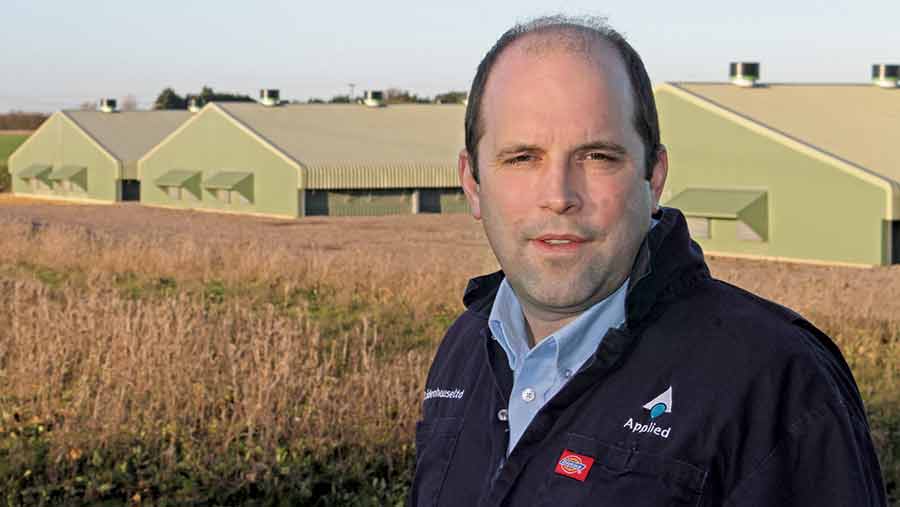The issues facing modern poultry farm management
 David Speller
David Speller Poultry producers will need to move to a more professional approach to employment in the coming years, believes one of the sector’s fastest growing entrepreneurs.
Keeping poultry farm managers on call for weeks on end, and expecting them to run all elements of that business without proper support will soon be a thing of the past
David Speller, owner of Applied Group, says using technology to provide support to farmers on the ground, so they can focus wholly on husbandry, would increase the longer-term viability of businesses, improve performance and solve recruitment problems.
See also: Outlook 2016: Profit margins positive for poultry
“When I looked ahead five years and the issues we face, it’s all about business efficiency for me, not just bird efficiency,” he said.
“Of course things like genetics and nutrition we need to push, but I leave that to the experts. I get the chick and the feed I am given, so I focus on the things I can do.”
Manager of all trades
One major problem is asking the modern farm manager to do too much.
“Technology is developing faster than farmer-managers can understand it. Recruiting farm staff is difficult and most are stockmen, not computer or ventilation technologists. We should be allowing the techie guys to do that job, and leave the animal guys to do theirs,” he said.
Three models for broiler farm management
- Owner operators – efficient and driven with long-term sustainability depending on the individual
- Integrator-owned farms – efficiency and drive can vary and are more sustainable due to depth of resources
- Management company or partnerships with the grouping together of people, which are efficient, motivated, and benefit from resources and sustainability by sharing things
“Traditional farm managers are getting up early, walking the birds, feed ordering, checking numbers to see if on budget: they’re a nutritionist, a vet, an accountant and they’re picking up dead birds. On top of that, they are responsible for maintenance. It’s unrealistic.”
As a result, birds can underperform. “We’ve got this genetic potential but are we using it? I doubt it. The bird is so finely tuned; if we are a little bit off the mark we’ve missed it for that crop.
“Birds reach kill weight quicker and margins are reducing, which means every hour matters more than ever. Plus, incorrect environmental conditions cause stress leading to health challenges.”
It can be a lot of risk to fall on one person – the manager. Where possible, technology should be used to assist the human function to 50% of the job, and the farm assistant another 30%, said Mr Speller.
“Embrace relationships and partnerships to give depth of resources. Nobody wants to work 24/7 alarm cover any more – forget it.”
Ever-tightening employment laws meant this was going to be more difficult to implement in future. How long would it be before farm managers on standby would be classed as working, he asked.
“That isn’t what you can expect people to do going forward. Offering them a house on the farm means they can’t leave work when they go home. People want to work hard, put the effort in, and then go home and have a life as well.”
Other 24/7 businesses, such as supermarkets and hotels do not rely one manager in charge 24/7 with a mobile phone on standby.
“Maybe there should be two managers on a farm, doing proper shifts. If you can’t go anywhere because there might be a heatwave, it’s stressful and draining, and pressures from their families in the background are massive.”
Salaries are another issue: “Managers running a £2m plus turnover poultry business are currently getting what you should be paying manager of a business turning over £200,000.”
Central support
Further help could come from stronger support from equipment suppliers.
“A centralised facility could have the capability to monitor every shed every day, and staff there would be trained in poultry production and ventilation to understand the data. It offers a centre where the farmer can call in and have remote support to help change settings or conditions in their sheds immediately.”
Such a monitoring station could know of a problem and correct it before the user even knew there was a problem, he suggested.
This sort of arrangement could mean a better chance that all the technical abilities of the equipment were used, because monitoring staff understood it better.
All this would lead to improved farm margins through efficiency drivers.
